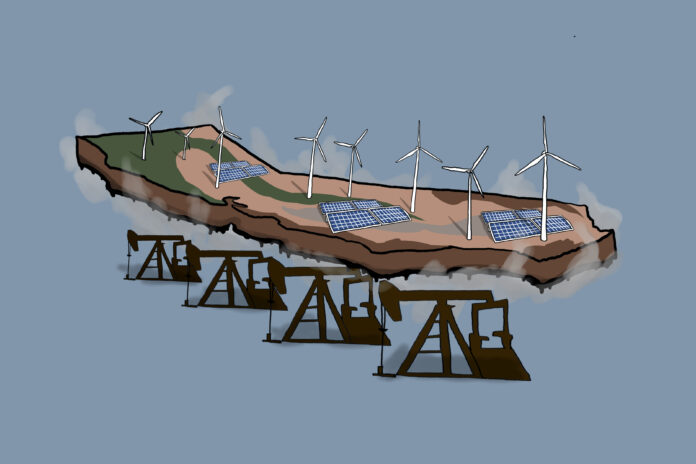Self-proclaimed environmental champions have a ways to go
Within the span of a few days last summer, I made the trip from Davis to the Bay area three times — twice by car, once by train. Each time I had a different view of the several massive oil refineries scattered throughout Richmond, Martinez and Benicia.
Oil refineries are visually stunning, with chaotic layers of pipes, stacks spewing pollutants into the air and dozens upon dozens of chemical storage tanks. The several oil refineries in my home state of Washington are a little more off the beaten path, so I found myself mesmerized watching these oily fingerprints of the fossil fuel industry go past my window. It was a stark reminder that despite positive rhetoric and an outward appearance of being “greener” than most other states, California still has a spectacular distance to go in the fight against climate change.
Many others received this important reminder a few weeks ago when several chemical storage tanks at an oil refinery in Crockett were destroyed by a fire, sending flames and plumes of smoke into the air and flooding our news feeds with videos and images of the accident.
As an environmentalist, it’s difficult for me to reconcile the idea of California being a global leader on environmental policy while also remaining strongly tied to the fossil fuel industry. A similar cognitive dissonance arises with Canada, another supposed leader on environmental and climate change policy that is finding it just as difficult to unchain its feet from the ball and chain of fossil fuels.
California has made a decent start by passing SB 100, which puts the state on the path to 100% clean energy by 2045. Yet, although Governor Gavin Newsom and his predecessor Jerry Brown have come under scrutiny for not doing even more right now, they understand that it’s a process.
“One cannot just turn off the switch. One cannot just immediately abut against a century of practice and policy,” Newsom said in an interview with the Los Angeles Times.
Even so, it is disheartening to know that California remains a leading producer of crude oil, that Governor Brown wouldn’t sign a ban on oil drilling in densely populated neighborhoods and that Governor Newsom still hasn’t done so either. The countless oil derricks hiding in plain sight throughout Los Angeles are an apt metaphor for the oil industry’s ability to stay alive in California.
Meanwhile, Canada has had difficulties of its own in trying to maintain its image as an environmental leader. Prime Minister Justin Trudeau recently approved a major pipeline from the Alberta Tar Sands to Vancouver, the day after Canada declared a climate emergency. Despite Trudeau’s inconsistencies on the environment, he managed to win reelection.
Many people look at these struggles as direct evidence that California and Canada are hypocrites when it comes to the environment, believing this proves you can throw as many so-called “eco-Nazis” as possible at an environmental issue, but still can’t get anything done.
I view it differently. I think that it’s evidence of how difficult it really is to wean ourselves off of fossil fuels. It’s also a necessary reminder that no matter how transformative and radical our ideal future sustainable energy policies would be, we still have billions of dollars tied up in the infrastructure and human capital of the oil industry.
This should not inspire pessimism; it’s simply a reality check. It serves as a necessary reminder that the change we want can’t happen overnight, and we must temper our expectations. It’s a reminder that although nobody can boast a perfect record on the environment, they will at least try to push us forward in meeting our environmental goals, moving away from dirty energy in any way they can.
The current administration promises the exact opposite. We have an obligation as environmentalists to be pragmatic and vote against the current administration’s cynical and destructive approach to environmental policy while continuing to make progress at the state level. No matter what.
Written by: Benjamin Porter— bbporter@ucdavis.edu
Disclaimer: The views and opinions expressed by individual columnists belong to the columnists alone and do not necessarily indicate the views and opinions held by The California Aggie.





You should make note of environmentally dubious subsidies, e.g. massive subsidies to the almond industry, which constitutes an enormous waste of water in a state that barely has enough as it is. And, of course, the kind of people who drink almond milk are the ones who drive a Prius and consider themselves socially responsible.